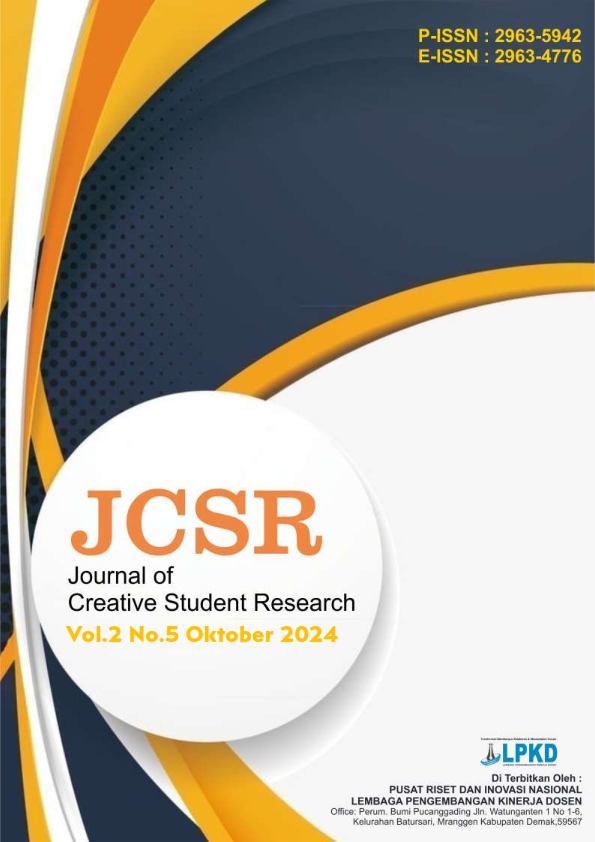Evaluasi Tingkat Pemahaman Pelatih di Kota Surabaya terhadap Atlet Kelas Festival dan Prestasi dalam Cabang Beladiri Taekwondo
DOI:
https://doi.org/10.55606/jcsr-politama.v2i5.4354Keywords:
Coach, Taekwondo, Kyorugi, PoomsaeAbstract
The role of the coach is very influential in producing competent athletes. The coach acts as a guide for the athlete to achieve the expected targets. Coaches at least understand what the concept of training is and the stages that athletes must go through before becoming elite athletesThis research aims to determine the level of understanding of Taekwondo Martial Art Coach in Surabaya City regarding festival and elite class athletes. This research is based on the results of the Level 1 Regional coach Training test for the sport of Taekwondo. The results of this research were obtained from the Regional Coach Training Level 1 which was attended by Taekwondo Coach throughout East Java, however the researcher will only analyze the test results from coach who live in Surabaya City. The number of sample values obtained came from 100 coach, both main trainers and assistant trainers. The assessment aspects taken in Level 1 Coach Training come from various tests carried out by several presenters. The material that will be included in the test assessment is Competition Rules for both the Kyorugi (Competing) and Poomsae (Art) categories, strength and conditioning, Kyorugi and Poomsae athlete fundamentals, LTAD (Long Term Athlete Development), Prevention and treatment of injuries in sports. The match competition rules tested refer to the latest rules used by the World Taekwondo Federation (WTF). The results of the pre-test and post-test showed an increase which could mean that the coach understood the material provided.
Downloads
References
Alfariza, G. (2021). Strategi komunikasi interpersonal pelatih bagi prestasi atlet Taekwondo Rahmi Kurnia Taekwondo School (RKTS) Daerah Istimewa Yogyakarta (DIY). Retrieved from https://www.krjogja.com/berita-
Aysegul, F. (2021). Coach-athlete relationship and sport confidence in Taekwondo. Pamukkale Journal of Sport Sciences, 12(2).
Azhimi. (2021). Pengaruh motivasi dan disiplin latihan terhadap prestasi Taekwondo di Kabupaten Ogan Ilir. 20.
Dwi Rahayu, A. (2022). Faktor internal dan eksternal dalam pencapaian atlet prestasi ekstrakulikuler Taekwondo di SMKN 2 Pamekasan. https://doi.org/10.47353/bj.v2i3.130
Faradita, M. (2016). Peran pelatih dalam pembinaan prestasi atlet pada organisasi Taekwondo profesional. Gadjah Mada Journal of Professional Psychology, 2(3), 186–199.
Fikria, H. (2022). Peran pelatih Taekwondo dalam memotivasi belajar anak usia dini di Club Ganghan Taekwondo Surabaya.
Geraldi Novian, & Mochamad Noors, I. P. (2020). Hubungan gaya kepemimpinan pelatih dengan prestasi atlet Taekwondo. Gladi: Jurnal Ilmu Keolahragaan, 11(2), 151–164. https://doi.org/10.21009/gjik.112.07
Indawan, P. Dr. H. S. A. MM. (n.d.). Revolusi mental mewujudkan tenaga pendidikan yang profesional dalam menyiapkan generasi emas Indonesia.
Jariono, G., Subekti, N., Indarto, P., Hendarto, S., Nugroho, H., & Fachrezzy, F. (2020). Analisis kondisi fisik menggunakan software Kinovea pada atlet Taekwondo Dojang Mahameru Surakarta. Transformasi: Jurnal Pengabdian Masyarakat, 16(2), 133–144. https://doi.org/10.20414/transformasi.v16i2.2635
Moenig, U., Kim, M., Choi, H., & Sim, S. (2015a). Coaching & kinesiology: An update on the rule and scoring equipment modification issues of the World Taekwondo (WT) competition system. Journal of Martial Arts Anthropology, 23(1), 44–52. https://doi.org/10.14589/ido.23.1.6
Moenig, U., Kim, M., Choi, H., & Sim, S. (2015b). Coaching & kinesiology: An update on the rule and scoring equipment modification issues of the World Taekwondo (WT) competition system. IDO Movement for Culture: Journal of Martial Arts Anthropology, 23(1), 44–52. https://doi.org/10.14589/ido.23.1.6
Oh, Y., & Cho, Y. (2023). Relationship between autonomy support coaching perceived by Taekwondo athletes and interruption intention: Mediating role of emotional intelligence. Physical Activity Review, 11(1), 60–68. https://doi.org/10.16926/par.2023.11.08
Padila, A. (2020). Pengaruh efektifitas komunikasi instruktisional pelatih terhadap atlet Taekwondo terhadap kinerja atlet saat bertanding.
Pudja Putra, E. (2020). Analisis cedera atlet Taekwondo Puslatda Jawa Timur 1.
Rahmandani, G. P. (2022). Kontrol diri pada atlet Taekwondo Kyorugi (konversi prestasi). Haaretz, 8(5), 2017, 2003–2005.
Sakti, H. (2016). Hubungan antara persepsi gaya kepemimpinan pelatih dengan efikasi diri pada atlet Taekwondo Kota Semarang. 5(2).
Salman, M. N. (2019a). As an educator: The evaluation of the competences of coaches from the point of view of the elite athletes: The case of elite Taekwondo athletes. Journal of Education and Training Studies, 7(9), 61. https://doi.org/10.11114/jets.v7i9.4289
Salman, M. N. (2019b). As an educator: The evaluation of the competences of coaches from the point of view of the elite athletes: The case of elite Taekwondo athletes. Journal of Education and Training Studies, 7(9), 61. https://doi.org/10.11114/jets.v7i9.4289
Sup Dong, L. (2022). Competition rules and interpretation.
Surapana, P. (2020). Tingkat pemahaman pelatih sekolah sepakbola terhadap kurikulum sepakbola Indonesia Filanesia di Kabupaten Kediri pada tahun 2020. Putra Surapana, I. Syafii.
Downloads
Published
How to Cite
Issue
Section
License
Copyright (c) 2024 Journal of Creative Student Research

This work is licensed under a Creative Commons Attribution-ShareAlike 4.0 International License.








